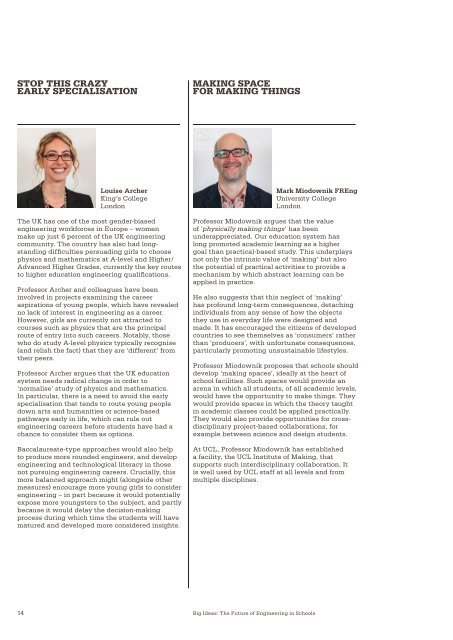BIG IDEAS THE FUTURE OF ENGINEERING IN SCHOOLS
10EyKv
10EyKv
Create successful ePaper yourself
Turn your PDF publications into a flip-book with our unique Google optimized e-Paper software.
STOP THIS CRAZY<br />
EARLY SPECIALISATION<br />
MAK<strong>IN</strong>G SPACE<br />
FOR MAK<strong>IN</strong>G TH<strong>IN</strong>GS<br />
Louise Archer<br />
King’s College<br />
London<br />
The UK has one of the most gender-biased<br />
engineering workforces in Europe – women<br />
make up just 6 percent of the UK engineering<br />
community. The country has also had longstanding<br />
difficulties persuading girls to choose<br />
physics and mathematics at A-level and Higher/<br />
Advanced Higher Grades, currently the key routes<br />
to higher education engineering qualifications.<br />
Professor Archer and colleagues have been<br />
involved in projects examining the career<br />
aspirations of young people, which have revealed<br />
no lack of interest in engineering as a career.<br />
However, girls are currently not attracted to<br />
courses such as physics that are the principal<br />
route of entry into such careers. Notably, those<br />
who do study A-level physics typically recognise<br />
(and relish the fact) that they are ‘different’ from<br />
their peers.<br />
Professor Archer argues that the UK education<br />
system needs radical change in order to<br />
‘normalise’ study of physics and mathematics.<br />
In particular, there is a need to avoid the early<br />
specialisation that tends to route young people<br />
down arts and humanities or science-based<br />
pathways early in life, which can rule out<br />
engineering careers before students have had a<br />
chance to consider them as options.<br />
Baccalaureate-type approaches would also help<br />
to produce more rounded engineers, and develop<br />
engineering and technological literacy in those<br />
not pursuing engineering careers. Crucially, this<br />
more balanced approach might (alongside other<br />
measures) encourage more young girls to consider<br />
engineering – in part because it would potentially<br />
expose more youngsters to the subject, and partly<br />
because it would delay the decision-making<br />
process during which time the students will have<br />
matured and developed more considered insights.<br />
Mark Miodownik FREng<br />
University College<br />
London<br />
Professor Miodownik argues that the value<br />
of ‘physically making things’ has been<br />
underappreciated. Our education system has<br />
long promoted academic learning as a higher<br />
goal than practical-based study. This underplays<br />
not only the intrinsic value of ‘making’ but also<br />
the potential of practical activities to provide a<br />
mechanism by which abstract learning can be<br />
applied in practice.<br />
He also suggests that this neglect of ‘making’<br />
has profound long-term consequences, detaching<br />
individuals from any sense of how the objects<br />
they use in everyday life were designed and<br />
made. It has encouraged the citizens of developed<br />
countries to see themselves as ‘consumers’ rather<br />
than ‘producers’, with unfortunate consequences,<br />
particularly promoting unsustainable lifestyles.<br />
Professor Miodownik proposes that schools should<br />
develop ‘making spaces’, ideally at the heart of<br />
school facilities. Such spaces would provide an<br />
arena in which all students, of all academic levels,<br />
would have the opportunity to make things. They<br />
would provide spaces in which the theory taught<br />
in academic classes could be applied practically.<br />
They would also provide opportunities for crossdisciplinary<br />
project-based collaborations, for<br />
example between science and design students.<br />
At UCL, Professor Miodownik has established<br />
a facility, the UCL Institute of Making, that<br />
supports such interdisciplinary collaboration. It<br />
is well used by UCL staff at all levels and from<br />
multiple disciplines.<br />
14 Big Ideas: The Future of Engineering in Schools


